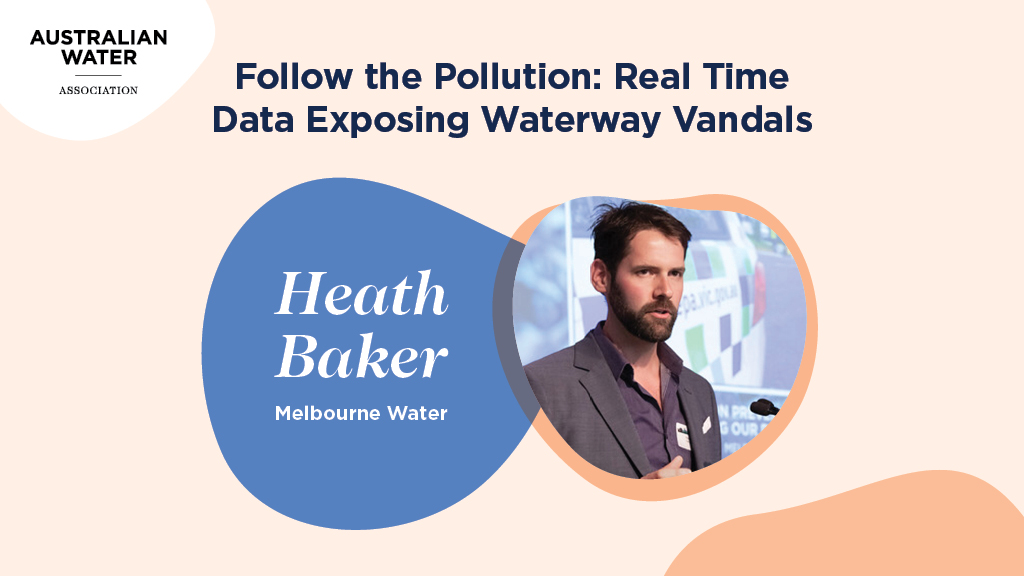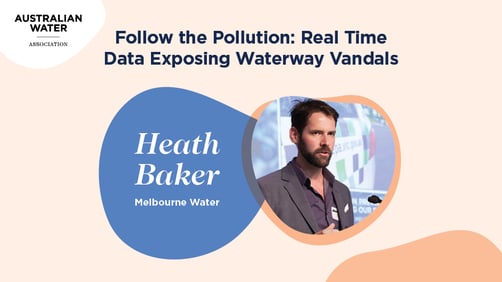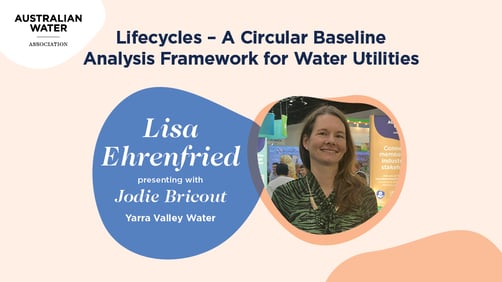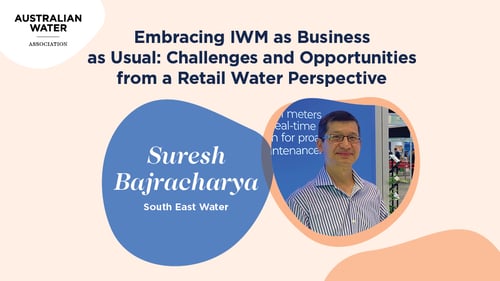Ozwater'21 Top Papers from Victoria

Victoria took out 3 of the 12 Ozwater'21 Top Paper accolades, with papers from:
- Heath Baker, Melbourne Water - Follow the Pollution: Real Time Data Exposing Waterway Vandals,
- Dr Lisa Ehrenfried, Yarra Valley Water presenting with Jodie Bricout, Lifecycles - A Circular Baseline Analysis Framework for Water Utilities, and
- Suresh Bajracharya, South East Water - Embracing IWM as Business as Usual: Challenges and Opportunities from a Retail Water Perspective.
Meet the presenters and hear more about their projects and experiences below.
Heath Baker
Heath won Ozwater’21 Best Paper Award. To find out more about Heath and his paper check out this video.
Lisa Ehrenfried 
What are the key takeaway points from your presentation?
The proposed circular economy framework is a great way to understand where the biggest circular economy opportunities are, based on the largest flows and largest CO2 impacts of those flows. We looked at water, nutrients, and materials as the 3 main ‘flow of stuff’ through our system.
Using recycled aggregate and crushed glass as embedment material stacks up as a fantastic, and immediate opportunity for implementing circular economy in construction and maintenance activities.
Better understanding CO2 generated in construction may result in different approaches to constructing assets, e.g., by comparing the CO2 impact of drilling vs digging for constructing a pipe, we realised that drilling has significant CO2 savings.
Where to next with your project?
I am working with leaders in construction and maintenance to include commercial KPIs around circular economy measures in future contracts, such as the use of recycled materials. Also, we’re working on how reporting waste to landfills/ recycled can be improved.
We are also looking to better understand carbon in construction, and how we can reduce embedded CO2 emissions through the choice of material or construction approach.
A couple of smaller initiatives are already happening across the business. Once people understand the circular economy and want to contribute to it, a lot more can be achieved. Following the training of circular economy champions, we are now exploring how more staff could be trained up in this space.
Why is Ozwater an important conference for you to present at?
It is THE place in the Australian water industry to share what we do with a wide audience of peers and contractors and researchers alike.
Have you seen any other stand out papers at the event?
There is a lot of promising work is being in the Circular Economy stream that I am keen to learn more about and connect with my peers. I am really looking forward to the resilience forum hosted by WSAA; getting serendipitous new insights and building connections that only happen at a live event.
Suresh Bajracharya
What are the key takeaway points from your presentation?
Melbourne water industry has unique roles and rules around water services management. Currently, there is growing support and momentum for IWM among our stakeholders. However, our efforts in embracing IWM as business as usual are still hindered by some restrictive policies, unclear role allocations, and lack of committed targets and funding.
Our research has identified some priority matters and some recommended actions for South East Water. Firstly, we must influence the government and other policymakers for enabling policies and targets for IWM. These include embedding IWM planning in urban planning processes, removing regulatory barriers for alternative sources of water, and treating stormwater as a valued resource. Secondly, we must lead the work in clarifying and communicating our role in emerging IWM services such as stormwater harvesting and rainwater management and take different measures to secure funding for IWM. In addition, we must support our customers, councils, and other delivery partners systematically and proactively to promote and deliver IWM outcomes.
Where to next with your project?
We have received great support from the Senior Leadership Team at South East Water to plan and implement some of the most critical actions identified through this research. We are already on our way to implementing many recommendations made in our discussion paper. For example, we have progressed with the recommendations for better customer engagement, and testing customer willingness to pay as part of our current preparation for the next pricing submission.
We are working with the Government and other IWM partners to establish credible and committed targets for IWM as part of the Catchment Scale IWM planning works, and preparation of Sustainable Water Strategy and Urban Water Strategy. In the next few months, we will be focussing on establishing a clear position and plan for our role in stormwater harvesting and rainwater management. We will be working with internal and external stakeholders to systematically plan and implement many of these recommendations. We will also be communicating the broad messages and learning from this project to other stakeholders to influence IWM uptake across the industry.
Why is Ozwater an important conference for you to present at?
Ozwater is the biggest congregation of water professionals in Australia which brings together all the agencies, institutions, and private industries involved in different aspects of water cycle management. IWM is still in its infancy and hence we need to continue learning, adapting, and improving our approaches to IWM. Ozwater is a fantastic opportunity to learn from others as well as to share our knowledge and experience with others so that we can grow together as an industry in securing a more sustainable water future.
What was the key takeaway for you from Ozwater'21?
I have seen many inspiring papers and presentations during this conference. One thing that stood out was, how similar our experiences are across Australia. It is great to see how committed and passionate we all are to securing a sustainable water future. Our industry is gearing up to face the challenges of population growth, climate change, and other emerging issues through innovative technologies, adaptive planning, and better engagement with the community. Our challenges will continue to evolve, and so we will. We must continue to share our learning and experience across the industry and work together. We have so much to be proud of, so much to learn from each other, and so much to look forward to.

